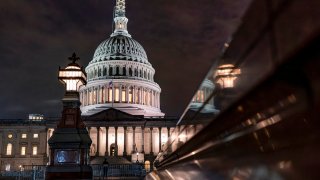
President Joe Biden will deliver his annual State of the Union address to a joint session of Congress on Thursday night, a speech seen as critical as he looks toward a rematch with former President Donald Trump in the November presidential election.
The speech gives Biden the chance to boast of his accomplishments in a televised address to the country.
Last year, an estimated 27.3 million viewers watched, though that was the second smallest audience in 30 years, and the year before that, 38.2 viewers, according to Nielsen, the company that measures television ratings.
Biden's speech comes unusually late this year and a full month after his speech last year. The addresses are typically given in January or February, but the timing is at the discretion of the speaker of the House, who invites the president.
Get top local stories in San Diego delivered to you every morning. >Sign up for NBC San Diego's News Headlines newsletter.
Republican Speaker Mike Johnson has not commented on the late date he chose, but it does come after key deadlines for averting a government shutdown and with the Super Tuesday primaries in the rearview mirror.
Here's what to know about the 2024 State of the Union address:
How to watch the State of the Union
U.S. & World
Biden’s speech will be shown live on all of the major network and cable television stations, including on NBC, MSNBC, NBC News Now, NBC’s online streaming network Peacock, and this website.
It also will be streamed online by the White House.
The speech starts at 9 p.m. ET/6 p.m. PT.
Who are the guests for the State of the Union?
The guests invited to the State of the Union address have stories that typically personalize issues in the news.
Among this year's guests is 31-year-old Kate Cox of Dallas, for whom the state of Texas refused to lift the state’s abortion ban. She was invited by first lady Jill Biden.
Cox went to court to end her pregnancy after she discovered that her developing fetus had been diagnosed with a rare chromosomal disorder known as trisomy 18, raising the risk of stillbirth or the death of her child shortly after birth. A lower court granted her request but the Texas Supreme Court ruled against her. By then she had gone out of state for an abortion.
Democratic Sen. Patty Murray of Washington is bringing another woman who traveled for an abortion. Kayla Smith was pregnant, living in Idaho in 2022, when at 19 weeks, she and her husband learned that their baby had serious and fatal fetal anomalies, according to Murray's office. Idaho's abortion ban does not have any exceptions for fatal fetal abnormalities or for the health of the mother, she said.

Democratic Sen. Tim Kaine of Virginia has invited the first person born in the United States through in vitro fertilization, Elizabeth Carr. Her presence follows an Alabama Supreme Court decision that embryos created through in vitro fertilization or IVF are to be considered children. As a result of the ruling, many of the IVF providers in the state paused treatment and IVF became an unexpected campaign issue.
Also expected to attend are family members of some of the Americans still held hostage in the Gaza Strip. Their invitation came from a bipartisan group of legislators. They are asking members of Congress and their staff to wear yellow ribbons and dog tags in solidarity.
The parents of Wall Street Journal reporter Evan Gershkovich, Ella Milman and Mikhail Gershkovich, will attend as guests of the speaker. Evan Gershkovich has been detained in Russia since March 29, 2023. The U.S government has called for his immediate release and says he was wrongfully detained.
Ukraine’s First Lady Olena Zelenska turned down an invitation from the White House, because of a scheduling conflict, her office told NBC News. Also declining, Yulia Navalnaya, the widow of Russian opposition leader Alexei Navalny, who died last month in a Russian prison.
Republican Sen. Josh Hawley has invited Dawn Chapman, the co-founder of a grassroots group called Just Moms in St. Louis and an advocate for victims of nuclear contamination. Hawley is working to reauthorize the Radiation Exposure Compensation Act.
What will Biden talk about in the State of the Union?
Biden has made abortion rights and reproductive care central to his campaign. A strategy memo obtained by The Associated Press late last year outlined other key themes such as protecting the country’s democratic values and improving the economy for the middle class.
Biden has been bedeviled by low poll numbers with an approval rating of 40% according to an NBC national poll in November, worries that at 81 he is too old for a second term and persistent concerns about the economy. The economy is growing, year-over-over inflation has dropped to 1.5%, excluding food and energy costs, and the country has so far escaped a recession that economists warned about, according to The AP.
He has been grappling with migrants crossing the U.S.-Mexico border, funding for Ukraine's war against Russia, and the Israel-Hamas war in the Gaza Strip. The humanitarian crisis in Gaza, with more than 30,000 Palestinians dead, according to the Hamas-run health ministry, has prompted some prominent Democrats to call for a ceasefire and has sparked a protest vote against Biden in some of the Democratic primaries.
David Greenberg, a professor of history at Rutgers University in New Brunswick, New Jersey, said that the State of the Union no longer drew the big audiences it once did. President George W. Bush had 51.7 million viewers for his first State of the Union in 2002, and the 62 million viewers for his second. President Barack Obama’s first State of the Union had 48 million people watching.
"It’s simply not that important anymore," Greenberg said in an email. "But it’s still an opportunity for Biden to preview themes of his campaign, make the case for his record as president – a strong economy, with inflation finally ending; a strong foreign policy; legislation passed; and so on."
"He also tends to be pretty strong and appealing when reading from the teleprompter and a good performance could quell some of the talk about his being too old to be president," Greenberg said.

Who will give the Republican rebuttal to the State of the Union?
The response from the Republican side will come from a rising star in the party, Alabama Sen. Katie Britt.
Britt, the first woman elected to the Senate from Alabama, was sworn into office last year. She has endorsed Trump.
"There is no doubt that President Biden’s failed presidency has made America weaker and more vulnerable at every turn," Britt said in a statement. "At this decisive moment in our country’s history, it’s time for the next generation to step up and preserve the American Dream for our children and our grandchildren."
Perhaps to highlight Biden's age, she is, at 42, the youngest Republican woman ever elected to the Senate.
Last year's response by delivered by Arkansas' Republican Gov. Sarah Huckabee Sanders.
A little bit of State of the Union history
An assessment of the state of the country is mandated by the U.S. Constitution but not the manner in which it is given. Article II, Section 2, says of the president: “He shall from time to time give to the Congress Information of the State of the Union, and recommend to their Consideration such Measures as he shall judge necessary and expedient.”
Like their modern-day successors, Presidents George Washington and John Adams gave their speeches in person,, according to the U.S. Senate website, but President Thomas Jefferson broke with that tradition and submitted his in writing. It was not until President Woodrow Wilson in 1913 that the address was again delivered in person.
President Franklin Roosevelt first called the speech the “State of the Union address,” which became the official name with President Harry Truman.
The modern broadcast era began in 1923 with the first radio address, followed by Truman's televised address in 1947, and President Lyndon Baines Johnson's spot in prime time in 1965. A televised response from the opposition party debuted in 1966.
A few other tidbits:
Each year, one member of the president's cabinet skips the address over concern that the Capitol could be attacked. The tradition began in 1984. Since the Sept. 11, 2001, terrorist attacks, selected members of Congress are also absent.
President Bill Clinton delivered the longest spoken address in 2000 at 1 hour, 28 minutes and 49 seconds. Clinton gave three of the five longest speeches, Trump the other two.



